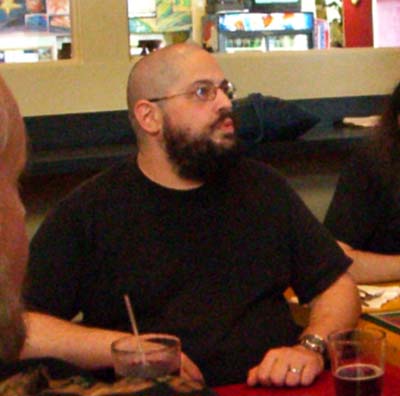Bits and pieces of things Charles Stross talked about
A lot of the time Charlie (as he calls himself) and a small group of other people talked about the space program. Shuttle. Arianne. Soyuz. That's all I picked up. Stross writes about a 1000-1500 words a day. On very productive days he's been known to write 5000. He passed over the veggie pizza because it did not seem to have cheese. (Actually, it was a stuffed pizza with cheese inside.) He does not like the news tickers, or crawlers (I don't remember which word he used. I think he was referring to the text that crawls along the bottom of the screen, not related to the story that's being narrated in the main part of the screen). "Eek!" he exclaimed.Charlie's adventures in tech industry
Before he went to write full time, he worked in the tech industry. He has his own dot-com crash story. After being a senior programmer, he was offered a position to head a software development department in a startup. He accepted. But, he admitted, he might have burned the bridges to his old workplace a bit prematurely. This was March 2000, he said and paused for a second, smiling, so we could see where this was going. All would have been good if his new company had had an IPO a few weeks earlier. The stock sale would have given it a big enough supply of cash. As it was, though, the stock market crashed and all of a sudden the company had just a few weeks to live.Pirates and accounting
He does plan to write a sequel to "Iron Sunrise". It will be a book about space pirates. Or, more accurately, about something that sounded like "charter accounting" or "enchanted accounting". Probably the former... though of course, some accounting practices that gained notoriety in recent years could be rightfully called "enchanted" :-) I said I will be curious to find out what is the connection between space pirates and accounting. He proceeded to explain what he had in mind. In the days of old, pirates had to work out a system how to divide the loot. For example, one pirate might have reached into the cleavage of a baroness and pulled out a super-expensive necklace, while another one might have grabbed something much cheaper. So, if I understood correctly, they needed some kind of well-defined accounting system to decide how to divide their bounty.
So the idea is, the way I understood it, that the space pirates will use causal channels to speculate in the futures of... well, whatever goods the ships will transport. What is a causal channel? Why, it is a channel of communication by quantum entanglement. Two entangled particles, when separated by a distance, no matter how big, if the quantum state of one of the particles is changed, the state of the other particle will change too. That means a faster than light communication. If ships fly slower than light, and somebody could communicate via a causal channel with the second party at the destination about the contents of the ship's cargo, then the second party would know what commodities, and what amounts of them, will be sold in the market years from now, and could profit from that information.
The problem is, as I found out later, that quantum entanglement does not allow faster-than-light communication. So I may have misunderstood what he said. Like I said, the environment was noisy.
But why would you call those speculators pirates?
As Charlie explained this concept, he paused a few times and smiled briefly as if to check if we were following. (By the way, Stross has one of the most beatific smiles I've ever seen.) I did my best to compose my best generic understanding facial expression, even as I was struggling to grasp what was being said amidst the noise and British accent. I wondered if a guy sitting next to me understood what this had to do with pirates. I'm not so sure. The guy made a not-entirely-relevant observation that pirates still exist even in our times, and that Texas has a particular brand of "inner tube pirates". When people go tubing down Texas rivers, they bring beer with them, and often they lose six-packs of beer, and there are actually "pirates" who jump into the river and grab that beer. At least that's what I think he said. If this sounds weird -- and it does, to me, but then I've never gone inner-tube floating -- I shall attribute it to my less than perfect listening skills.
Charles Stross. Here are more posts from ArmadilloCon 2005.





No comments:
Post a Comment